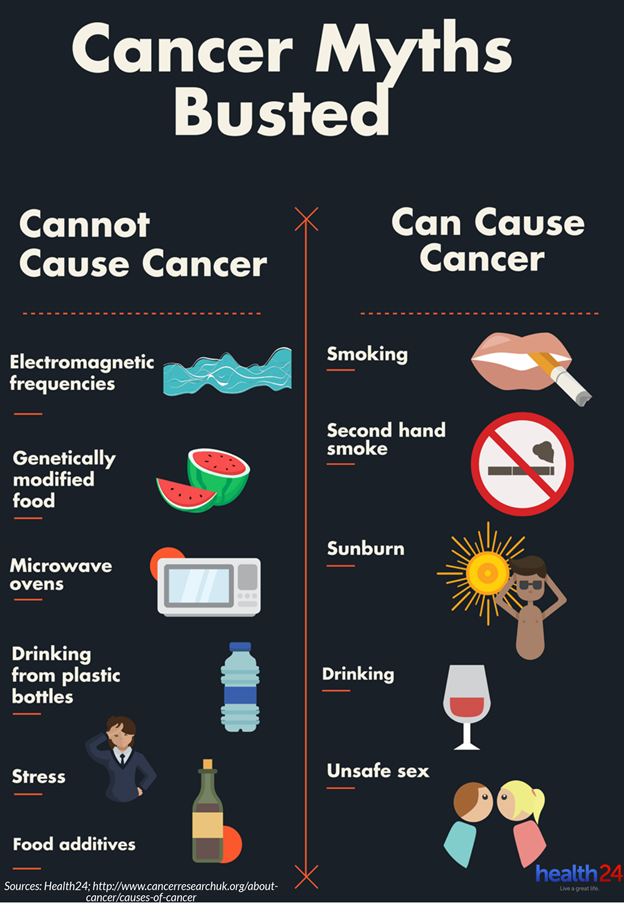Wearing A Bra Doesnt Increase Your Risk For Breast Cancer
Well bust this myth right off the bat. Despite what you might have heard, Dr. Blake says wearing a bra doesnt increase your chances of getting breast cancer.
From a breast cancer standpoint, wearing a bra doesnt impact your risk of breast cancer. Ive been asked before if underwire bras can affect someones breast cancer risk and they do not. So, wearing a bra doesnt increase, nor does it decrease, your risk for breast cancer.
Does Deodorant Cause Cancer
Using deodorant or antiperspirant does not cause breast cancer.
Claims that deodorants or antiperspirants increase your risk of breast cancer have been around for several years.
Some people have also claimed that aluminium in antiperspirants can increase your risk.
However, theres no convincing evidence of a link between breast cancer and deodorants, antiperspirants or their ingredients.
Who Is At Risk
IBC is more common in females than males, but its possible for males to develop it, too. Research tells us that women from African-Caribbean backgrounds have the highest risk of developing IBC, and having a close family member who has had breast cancer is also associated with increased risk. Obesity is another risk factor for IBC.
Read Also: What Organs Are Affected By Breast Cancer
Metastatic Breast Cancer And Pain
Metastatic breast cancer may also cause pain. It could be from a larger tumorthese are often over 2 centimeters in diameteror pain in other regions of the body due to the spread of cancer. If breast cancer spreads to your bones, it may cause bone pain, or back pain with leg weakness. If cancer spreads to your brain, it may cause headaches.
If breast cancer travels to the adrenal glands, you may feel a dull back pain. If your breast cancer spreads to your liver, you could have pain in the upper right part of your abdomen and develop jaundice .
How To Distinguish Ibc From Other More Common Conditions

It can be hard to distinguish breast changes caused by inflammatory breast cancer from other common conditions, such as an ordinary rash, allergic reaction, or infection. Thats why its important to see a health care provider as soon as you notice any of these changes to figure out the cause and get treatment, if necessary.
Read Also: What Does Stage Three Cancer Mean
Can Wearing Bra Cause Breast Cancer
The authors suggest that bras can compress the lymphatic system of the breast, causing toxins to become trapped in the breast tissue to cause cancer. The overall consensus among doctors is that neither the type of bra worn nor the tightness of undergarments has any connection to the risk of breast cancer.
Recommended Reading: How To Reduce Breast Cancer
Can Nipple Piercing Cause Breast Cancer
Nipple piercings have become a popular trend. But theres currently no evidence that having pierced nipples increases the likelihood of developing breast cancer.
However, the area pierced is at risk of infection, at the time of the piercing and as long as you wear the jewellery, possibly even longer.
Don’t Miss: Symptoms Of Recurring Breast Cancer
Breast Cancer And Sleeping In Your Bra Or Wearing A Bra For Too Long
According to the myth, wearing your bra every night or for too long daily prevents your pores from being able to breathe. Sweat accumulates and toxins build up which are believed to cause breast cancer. The same applies for wearing a bra which is too tight. This version of the bra myth has equally been excused as implausible by leading cancer organizations, scientists and breast surgeons alike.
How Are Breast Lumps And Pain Diagnosed
If you find a breast mass or lump, you should schedule an appointment with your health care professional who will do a breast examination to check your breasts for irregularities, dimpling, tightened skin, lumps, inflamed or tender areas, and nipple discharge. The areas of each breast and underarms will be examined.
If your doctor finds a lump at this time, you may have a re-examination in two to three weeks. If it is still present, then your doctor may recommend some further testing. The ideal time for the breast examination is seven to nine days after your period.
If the physical examination is normal and no mass is found, laboratory and imaging tests are not usually necessary in women younger than 35 years. Women older than 35 years should probably still have a mammogram unless they have had a mammogram in the past 12 months.
You May Like: Grade 3 Breast Cancer Prognosis
Why Should You Not Wear A Bra While Sleeping
Most women may want to know if wearing a bra at night is good or bad. There is some confusion regarding the practice of wearing a bra at night. While some women may wince at the mere thought of it, others believe that the extra support can avert sagging breasts. But wearing a bra at night hardly impacts sagging breasts. Thus, the aim of providing support to the breasts by wearing a bra becomes redundant, because the breasts naturally push back down against the chest. Although it is a womans personal choice, a bra which is neither tight nor stiff may be comfortable for bedtime, and ideal from a health perspective. Some of the reasons why you may not prefer wearing a bra while sleeping can include the following points:
What Are Fibroadenomas
A fibroadenoma is a benign, or noncancerous, breast tumor. Unlike a breast cancer, which grows larger over time and can spread to other organs, a fibroadenoma remains in the breast tissue.
Theyâre pretty small, too. Most are only 1 or 2 centimeters in size. Itâs very rare for them to get larger than 5 centimeters across.
Usually, a fibroadenoma wonât cause any pain. It will feel like a marble that moves around beneath your skin. You may describe the texture as firm, smooth, or rubbery. In some cases, though, you wonât even be able to feel it at all.
Read Also: Breast Cancer Stage 3 Treatment Options
What May Cause Non
There are several possible causes of breast pain that dont relate to your menstrual cycle, Dr. Grabenstetter says.
- Large breasts. If youre particularly well-endowed, youre more likely to have breast pain. Large breasts can stretch Coopers ligaments connective tissues that help give your breasts their shape which may cause aches and pains.
- Breast cysts. Fluid-filled sacs within the breast can also cause pain. Cysts may occur one at a time, or you may have several in one or both breasts.
- Mastitis. This infection of the breast tissue usually relates to lactation and breastfeeding.
- Pain from elsewhere. Sometimes breast pain doesnt have anything to do with your breasts. The pain you feel in your breasts may actually originate in your chest wall or pectoral muscles. Or you may feel nerve pain from a problem in your spine in your breasts.
- Cancer. In rare cases, inflammatory breast cancer can cause pain. But this type accounts for less than 5% of all breast cancers, so it isnt a particularly likely culprit if your breasts are hurting, Dr. Grabenstetter says.
Does Not Wearing A Bra Cause Sagging

Not wearing a bra for weeks or months can only mean that your breasts have since booked a trip to Sag Harbor, right?
Wrong.
Dr. Blake says wearing a bra doesnt prevent your breasts from sagging and not wearing one doesnt cause your breasts to sag.
Wearing a bra doesnt affect the risk of breast sagging, or what is called breast ptosis. It also wont impact the shape of your breasts. However, if you are a larger cup size, you may feel more comfortable wearing a bra because it might help alleviate or prevent back pain, which is often due to the weight of your breasts. Wearing a sports bra could be helpful in that matter, says Dr. Blake.
Dont Miss: How Would I Know If I Have Breast Cancer
Read Also: What Does Stage 3 Breast Cancer Mean
Emotional Effects Of Breast Cancer Treatment
Once treatment begins, its normal to have a range of emotions. Maybe on some days youre feeling sad or anxious, or on other days, quiet and resolved.
People have different ways of responding emotionally as treatment progresses. Some people loudly celebrate the end of a treatment phase. Others close a treatment chapter from a more reflective, quiet space. Worries about the future, side effects, or what it means when you finish treatment may be on your mind. Getting the information you need, when you need it, can help you feel stronger and more confident.
As you begin treatment, its important to know that many breast cancer medicines cause side effects that can feel like stress, anxiety, or depression. Some treatments directly affect your emotions, while others may impact sleep, desire for food or sex, and other things that could put anyone in a bad mood. Understanding the source of any negative feelings can help you and your care team know how to treat them.
, and , including surgery from donor sites in other parts of the body. Surgery can also include removal and, for some, removal of the ovaries to reduce the risk of future cancer. When youre facing, undergoing, and recovering from breast surgery and surgery on any other parts of your body, its completely normal to have a lot of emotions, some of them intense.
Improving Sleep And Coping With Cancer
For people with cancer who are experiencing sleeping problems, its important to talk with a doctor who can discuss their symptoms, whats causing them, and potential solutions. Because of sleeps effect on physical health, emotions, and thinking, better sleep can create meaningful quality of life improvements for cancer patients.
Counseling and medications can both benefit sleep. In studies of people with breast cancer, treatment with cognitive behavioral therapy for insomnia , which tries to reframe negative thoughts about sleep, has been found to enhance sleep and mood while strengthening immune function. Combining CBT-I with medications may have additional effectiveness in improving sleep and quality of life.
It may also help cancer patients to upgrade their sleep hygiene, which includes their bedroom setting and daily sleep habits. Examples of these improvements include following a consistent sleep schedule, ensuring the bed and bedroom are comfortable and inviting, and minimizing the use of electronic devices in the lead-up to bedtime.
Also Check: Does Getting Punched In The Breast Cause Cancer
Oxidative Stress And Dna Damage
Oxidative stress is known to cause DNA damage and is related with increased risk of breast cancer. On the other hand, antioxidants decrease DNA damage. Oxidative stress-induced DNA damage may be an essential pathway by which sleep disturbance may have effects on breast than circadian disruption .
Sleep have antioxidant impacts, giving an opportunity for the body to expel oxidants produced during alertness .
Many studies showed that sleep disturbance may increases reactive oxygen species . ROS can lead to DNA damage by binding to neighboring molecules with unpaired electrons, causing strand breaks and its formation link between circadian cycle and sleep hardship .
Sleep disturbance contribute to oncogenesis through damage cellular, and disrupting the circadian cycle. Oxidative stress play an important role as a mediator of cellular apoptosis sleep deprivation-induced oxidative stress can permit the mutated cells to elude apoptosis. Circadian cycle also involved in this pathway.
What Are The Symptoms Of Fibroadenomas
Since theyâre usually painless, you might not notice one until you feel a lump while youâre in the shower or during a self breast exam.
Other times, a doctor might find it on a mammogram or ultrasound.
Unlike breast cancer, a fibroadenoma doesnât cause nipple discharge, swelling, redness, or skin irritation around the breast.
You May Like: Estrogen Positive Progesterone Negative Breast Cancer
Questions To Ask Your Health Care Team
-
Could sleeping problems be a side effect of my cancer or treatment plan?
-
If I have sleeping problems, who should I tell on my health care team?
-
Should I track my sleeping problems? What is a sleep diary?
-
What changes to my daily habits would you recommend for better sleep?
-
Are there treatments or medications I can take to improve my sleep?
Related: 6 Breast Cancer Risks You Should Stop Believing This Instant
The bottom line: If you feel OK without a bra on at night, then let those girls be free. If you have a larger chest and feel more comfortable with your boobs secured in place, then thats also OK. Usually, a soft, cotton bra will leave fewer lines than a wired push-up, so opt for something that will help you relax during sleep, and know your lovely lady lumps are safe either way.
Gif courtesy of giphy.com
Read Also: Does Breast Hurt With Cancer
Read Also: Breast Cancer Stage 1 Survival Rate
How Cancer Affects Sleep Quality
Having cancer can create major sleep disruptions, affecting the ability to fall asleep and stay asleep through the night.
It is estimated that half of all people with cancer have sleep problems. Some studies have found even higher numbers of sleep disturbances with nearly 70% of women with breast and gynecologic cancers having symptoms of insomnia. The rate of disrupted sleep appears to be even higher in patients with advanced cancer, reaching up to 72%.
Even worse, there are indications that these numbers may be underestimated since many cancer patients do not raise sleep concerns with their doctors.
There are numerous potential causes of sleeping problems in people with cancer:
- Pain or discomfort caused by a tumor or by treatment
- Gastrointestinal or urinary problems caused by cancer or its treatment
- Struggles to sleep during hospital stays
- Stress, anxiety, and depression that can result from having cancer
- Infection and fever, which may occur as a result of reduced immune function during chemotherapy
- Cough or difficulty breathing
- Side effects from medications, including pain medications, which may cause drowsiness but interfere with quality sleep
- Disrupted sleep schedule resulting from daytime fatigue and napping
More than one of these factors may contribute to sleeping problems, which can vary for any individual depending on the type of cancer they have, the treatment they are receiving, and their overall health, including coexisting conditions.
How Are Fibroadenomas Diagnosed

If you find a lump in your breast, you should see your doctor. You canât tell for sure what it is by how it feels.
Your doctor will likely feel the lump so they can gauge its texture and size. Even if they think it might be a fibroadenoma, they may recommend that you get more tests to confirm it.
You may get an ultrasound or a mammogram, depending on your age and whether youâre pregnant. Both are quick scans that youâll get in the doctorâs office.
A radiologist will then check the images of your breast tissue to see if itâs a fibroadenoma or something else.
The only way for a doctor to know for sure that itâs a fibroadenoma is through a biopsy, which means taking a sample of the lump to test in a lab. Based on the results of your examination and scan, your doctor will decide whether they need to get extra confirmation from a biopsy. To do a biopsy, a doctor will insert a thin needle into your breast and pull out a small sample from the lump.
You May Like: What Does Invasive Breast Cancer Mean
Sleep And Cancer Risk
Evidence has emerged that different components of sleep sleep duration, sleep quality, circadian rhythm, and sleep disorders can affect cancer risk. That said, studies on this topic are not always consistent or conclusive, which may reflect difficulties in accurately gathering data about sleep over the long term.
Sleep Duration
Studies about the effect of sleep duration on cancer risk have often been conflicting. Differences in results may relate to how sleep data is collected, the types of cancer considered, and how other factors that can influence cancer risk are accounted for.
Research has found that people who sleep less than six hours per night have a higher risk of death from any cause, and one large-scale study found that people with short sleep have an increased cancer risk.
For specific types of cancer, short sleep duration has been associated with a greater risk of colon polyps that can become cancer. In older adults, some research has tied reduced sleep duration to a higher likelihood of stomach cancer and found potential correlations with Non-Hodgkin Lymphoma as well as cancers of the thyroid, bladder, head, and neck.
These studies, though, are far from definitive. Many types of cancer, including lung cancer, have not been found to be affected by short sleep in other studies. Some research has even found fewer cancer cases in people sleeping less than seven or eight hours per night.
Sleep Quality
Circadian Rhythm
Obstructive Sleep Apnea
Myth: Wearing A Bra While Sleeping Causes Sagging Breasts
This myth stems from the idea that your breast tissue can lose their strength if you wear bras for long periods of time. The idea comes from Professor Jean-Denis Rouillen, a sports medicine specialist, did a15-year study to understand whether bras can cause sagging breasts and made the conclusion that wearing bras encourages laziness of the pectoral muscle.
However, there has been no published study and no peer review done on Professor Rouillens findings, and scientists have said the sample size is too small so the research is inconclusive.
In fact, many factors such as genetics, ageing, weight changes, hormonal phases and pregnancy can cause sagging breasts. There is simply no scientific evidence that wearing a bra while sleeping can cause sagging breasts.
Recommended Reading: What To Expect During Chemo For Breast Cancer